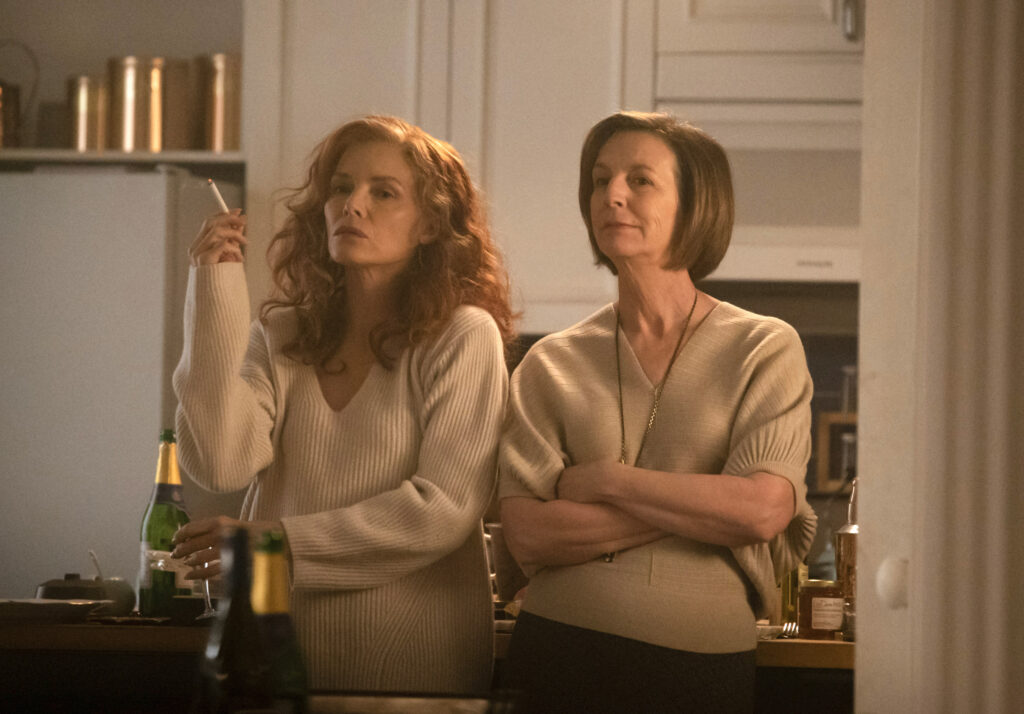Michelle Pfeiffer all but purrs her way through French Exit, as befits a splendid actress who cut a memorable Catwoman onscreen nearly thirty years ago. Playing a New York grande dame who deals with bankruptcy by decamping with her son Malcolm (Lucas Hedges) to Paris, Pfeiffer informs the character of the mortality-obsessed Frances Price with an implicit "meow", as if forever finding fault with a world in which, short of funds, she is now surplus to requirements.
Pfeiffer is the star attraction of Azazel Jacobs's film, which she powers her way through as if playing a longlost Tennessee Williams heroine by way of Auntie Mame. (If Pfeiffer had the theatre chops, she'd make a perfect Princess in Sweet Bird of Youth.) The movie may oftentimes be a bit much, not least in a decidedly arch screenplay by the Canadian writer Patrick deWitt based on his 2018 novel: "Did you drink to the brink of sound reason?" goes a question posed within minutes of its opening.
 But Pfeiffer's command of the material is so complete that she keeps you on side even when the material itself gets derailed, whether in a tonally bizarre encounter with a homeless man in New York or, once in Paris, a scene in which Frances sets a cafe table alight in a rather dramatic bid to get l'addition. Coy and flirtatious but with a capacity for violence that allows her to wave kitchen knives with abandon, Frances doesn't take readily to the news delivered at the outset that her funds have run out. (She has been warned of this eventuality for some seven years.)
But Pfeiffer's command of the material is so complete that she keeps you on side even when the material itself gets derailed, whether in a tonally bizarre encounter with a homeless man in New York or, once in Paris, a scene in which Frances sets a cafe table alight in a rather dramatic bid to get l'addition. Coy and flirtatious but with a capacity for violence that allows her to wave kitchen knives with abandon, Frances doesn't take readily to the news delivered at the outset that her funds have run out. (She has been warned of this eventuality for some seven years.)
Offered a flat in Paris by her chum Joan (Susan Coyne, pictured with Pfeiffer above), Frances scoops up Malcolm and sets sail for France on a sea crossing that allows the lovesick lad to have a fling with the ship's resident medium (Danielle Macdonald) who, before long, has found her way to Frances's Parisian abode along with most of the rest of the cast. That retinue allows for the re-entry into proceedings of Malcolm's onetime fiancée Susan (Imogen Poots, once again sporting a flawless American accent as she has before onstage), whose new beau, Tom (Daniel di Tomasso, pictured below with Poots), turns on the assemblage with a venom that many a spectator may by that point well share.
Along the way, Frances enjoys many a chat with her cat, who - I kid you not - would appear to be channelling the spirit of her long-dead husband, who happens to be sonorously voiced by, of all people, Tracy Letts. Frances, meanwhile, makes much of an ongoing dance with death, referring to her reduced social and financial status as her third act, or "coda", and speaking a language of self-immolation in keeping with the gatheringly elegiac tone of the movie as a whole.
 The film doesn't need quite so much explanation of Frances's peculiar behaviour: "She's upset in the general sense," opines Malcolm (as opposed to what other sense, one wonders), some while after her aggrieved New York accountant has remarked of Frances, "they broke the mould with that one". Things perk up once the commentary on Frances ceases and Pfeiffer is allowed simply to be, her eyes gleaming as she lights one cigarette after another like a figure out of those legendary Blackgama ads of old.
The film doesn't need quite so much explanation of Frances's peculiar behaviour: "She's upset in the general sense," opines Malcolm (as opposed to what other sense, one wonders), some while after her aggrieved New York accountant has remarked of Frances, "they broke the mould with that one". Things perk up once the commentary on Frances ceases and Pfeiffer is allowed simply to be, her eyes gleaming as she lights one cigarette after another like a figure out of those legendary Blackgama ads of old.
Hedges brings to the key supporting role of son-as-onlooker the signature affectlessness for which he is by now well-known, and the movie is nicely bookended by scenes of his younger self (Eddie Holland) with a mum who even then is seen to be her own woman, and convention be damned. That's as it should be for an agelessly fine actress who owns French Exit, even if Frances's own wished-for exit from the world remains up for grabs.















Add comment